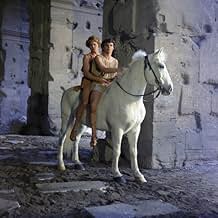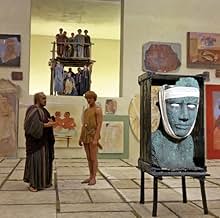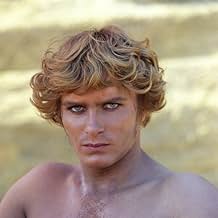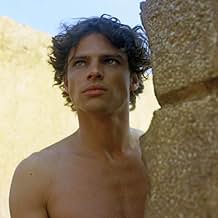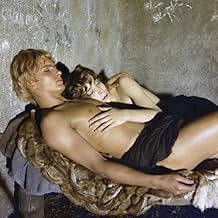Una serie di racconti mitici sconnessi ambientati nella Roma del primo secolo.Una serie di racconti mitici sconnessi ambientati nella Roma del primo secolo.Una serie di racconti mitici sconnessi ambientati nella Roma del primo secolo.
- Regia
- Sceneggiatura
- Star
- Candidato a 1 Oscar
- 5 vittorie e 8 candidature totali
- Trimalcione
- (as Il Moro)
- Scintilla
- (as Danica la Loggia)
- La matrona
- (as Lucia Bosé)
- Il suicida
- (as Joseph Weelher)
- Minotauro
- (as Luigi Montefiori)
Recensioni in evidenza
Reportedly a free adaptation of the now fragmentary writings of Petronius, the film also makes fleeting references to various scattered works and myths of antiquity. Even the language is a blend of various dialects and accents, effectively brewed together into a type of "primordial soup."
The film features a young man named Encolpio and his sometime friend Ascilto; both of whom seem to prefer participatory experience as a means to finding meaning in life while primarily disregarding status, power and possessions. Contrasting some of the film's more serene scenes with those of unrest and discord, patterns supportive of a life lived from a similar experiential perspective begin to emerge. Some examples are as follows:
During the "Death to the Classics" scene, the poet Eumolpo says that the arts have declined because the desire for "virtue" has been lost. Dialectical discussion and philosophy have been replaced with drinking, vice and monetary greed, thus preventing further creation of works of art at the same pinnacle of excellence as the classics.
Later when Eumolpo and Encolpio recline in the open field encased in an early morning mist, the elderly poet bequeaths to Encolpio a series of "natural" phenomena; among them mountains, rivers, clouds, love, tears, joy, sound, song and the voices of man...
During the "Matron of Ephesus" scene, a young woman mourning her deceased husband by starving to death in a cave has her chalk white face returned to its natural radiance after accepting the embrace of a handsome soldier. The moral being "...better to hang a 'dead' husband than to lose a 'living' lover..."
A politically doomed and suicidal married couple free their slaves whereupon a reference is made to the "sacred" earth. Their children are sent away to a place free from tyranny which will be "beautiful." Later, Encolpio and Ascilto arrive at the couple's elegant home and enjoy a night of revelry during which Encolpio quotes the "poet" as having said "...as for me I have always lived to enjoy the present moment as if it were the last sunrise..."
The tale of the beautiful Enotea and her subsequent punishment after she tricked the wizard who had professed his love for her seems to be a warning to remain "true" to expressions of affection.
Following what appears to be his final corruption after having abandoned his idealistic philosophy, Eumolpo proposes an interesting last will and testament. Those wishing to inherit a part of his worldly fortune are asked to devour his remains. Reflecting the hippie generation's symbolic scorn of rampant materialism during the shooting of this film, Encolpio and his friends smile and turn away, heading onward toward a new adventure.
The scenes of discord in the film appear to reflect issues related to social and political methods of enforced control over others. For example, during the banquet of Trimalcione, his sycophants eat, laugh, chant, dance, perform and throw objects on cue. While a captive at sea, Encolpio is made an object of entertainment for the pirate Lica. Later he is forced to battle a huge "minotaur' for the entertainment of a proconsul and his puppet court during the "gladiator prank" sequence.
Fellini makes strong use of colour symbolism in "Satyricon." The film opens in what appears to be a large Roman steam bath. There is the occasional sound of water dripping, and in Encolpio's tenement a seemingly wealthy group of party goers arrive on a small boat in the water, perhaps ready to go "slumming" with the poor. There is also a bluish tint to many of these early scenes as if they were being viewed through water. Later, during Trimalcione's feast, a flame red lens filter appears to overshadow the initial candle lit display giving the impression of an envelopment of fire. During the outdoor scenes on Lica's boat, the sound of the wind is recurrent and a blitz of snow appears providing a possible reference to the air element. Near the end of the film, Encolpio enters a maze by sliding in the dirt down a hillside. Following his battle with the minotaur, a dust storm blows as he attempts to make love with Arianna. Later, when he visits the elderly Enotea, she lets dirt fall from her clenched fists as if giving a silent reference to the earth element.
There are also many references to the supernatural and paranormal. Eyes stare into the camera as if to give reference to phantoms from antiquity looking at those presently alive as if to question. While Encolpio and Eumolpo have their discussion in the art gallery, a two tiered galley of soundless faces inexplicably passes by like unknown entities observing the men's conversation through a hole in the wall. There is a curious space-like object on the deck of Lica's ship. In addition, a momentary glimpse of supernatural visionary lights appear during the abduction of the "mystical" hermaphrodite who subsequently dies after having been exposed to the "light" of day. The film also presents a recurring symbolism of carved and imprinted heads eventually given great emphasis with Lica's startling decapitation. Perhaps the question is, has society become too obsessed with the intellect at the expense of the heart and the inherent value of the individual person? Perhaps not so for Fellini, as the entire film is intensely alive with a glorious blend of color; each face, each person, in Fellini's words, serving as an integral part of his artwork on film.
Finally, like the eternal wheel and his initial greeting, Encolpio's farewell is presented in front of a stone background and he is interrupted in mid sentence giving ....
The film is freely adapted from Petronius' book, which is the exploits of two young Romans, Ascilto and Encolpio, as they venture throughout the empire, indulging in both heterosexual and homosexual relationships In the course of this proliferation of sensuality, Ascilto becomes impotent and madly goes for a cure which ends in tragedy for Encolpio
The movie's treatment of the sexual decadence is remarkably powerful without being explicit In fact, in light of the mental images it presents, it actually puts on view very little on screen But there is a great quantity of mysterious whores, hedonists, gluttons, and gross indulgence in carnal pleasure In the midst of this chaos, however, there is a beautifully light reprieve as the young Romans come across a forsaken villa... A very charming slave girl has remained behind, and she playfully troubles the two men into an erotic game
Apart from that, the sex is portrayed as bizarre, tempting, suggestive of hidden secrets, violating the rules of morality, and going beyond the limit
As Vincent Canby said in his review, from 1970 in the New York Times, 'Fellini Satyricon is its own justification'. This movie exists purely to engage on an aesthetic level. The surrealism, the carnival-of-life atmosphere, the monumental pageantry, the visual juxtaposition of beauty and ugliness, and the black humour are all the film possesses and are all it requires. I believe that Fellini's intention with this film was simply to entertain. And he was a master entertainer, no doubt.
Don't expect much in the way of characterisation, of complex plot developments, or of nifty moral expression. This is a film that looks and sounds beautiful, and it manages to hold your interest (or mine anyway, I can't speak for everyone) for two brief hours by doing just that. Fellini = Godlike genius.
Lo sapevi?
- QuizGian Luigi Polidoro registered the title Satyricon (1969) for his movie first. Federico Fellini fought to use the title for his movie but lost the case. Subsequently the title was changed to Fellini Satyricon.
- BlooperIn one version, Joseph Wheeler is credited as 'Joseph Weelher'.
- Citazioni
Soldier at Tomb: They've stolen the hanged man! While I was with you, the thief's family took him away! I know what punishment I'll get... a horrible death. Why should I wait for it? I'd rather die by my own hands.
[pulls his sword out and is about to stab himself]
Wife of Ephesus: [stops him] No! No, my dear... To lose the two men in my life, one after the other, would be too much...
Wife of Ephesus: [looks at the corpse of her husband] Better to hang a dead husband than to lose a living lover.
[the couple replace the missing hanged corpse with the corpse of her husband]
- ConnessioniEdited into Federico Fellini: Sono un gran bugiardo (2002)
- Colonne sonoreThe Drums for the Niegpadouda Dance
From Anthology of Music of Black Africa
Recorded by Everest Records
Arranged by Bernard C. Salomon
Published by Arvon Music
I più visti
- How long is Fellini's Satyricon?Powered by Alexa
Dettagli
Botteghino
- Budget
- 3.000.000 USD (previsto)
- Lordo Stati Uniti e Canada
- 1.135.943 USD
- Lordo in tutto il mondo
- 1.138.108 USD
- Tempo di esecuzione2 ore 9 minuti
- Mix di suoni
- Proporzioni
- 2.35 : 1
Contribuisci a questa pagina







